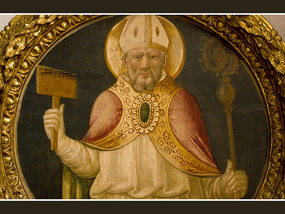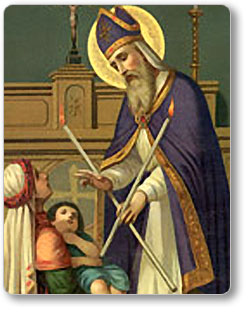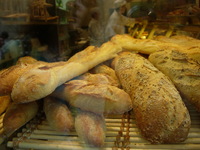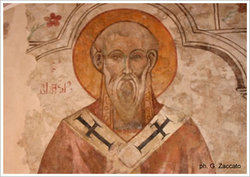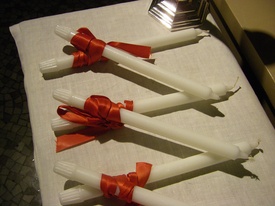 O God, Who does gladden us by the annual solemnity of blessed Blase, Thy Martyr and Bishop; mercifully grant that we may rejoice in the protection of him whose heavenly birth we celebrate.
O God, Who does gladden us by the annual solemnity of blessed Blase, Thy Martyr and Bishop; mercifully grant that we may rejoice in the protection of him whose heavenly birth we celebrate.
Jesus Christ cares for the ill and the Church, the sacrament of Christ on earth, continues the mission of Christ of healing by asking God to do the loving thing: to heal the sick according to His holy Will. One of the most ancient and revered customs in the Church, therefore, is the offering of prayer and doing fitting good works for the sick to relieve greatest burdens which afflict the human body and spirit.
The ministry of the Church is not what heals or saves someone because on its own it has no such power; it is the faith in the power of the Lord Jesus whose grace provides comfort to the sick; it is the Lord who heals and it is Holy Spirit which works through human agency. And in all that, we believe that our sufferings are connected to (identified with) the sufferings of Christ for the salvation of sinners. As the Pope said recently, “Jesus suffered and died on the cross for love. In this way He gave meaning to our own suffering, a meaning that many men and women of all ages have understood and made their own, thus experiencing profound serenity even amid the bitterness of harsh physical and moral trials”.
Still, it is the will of God that believers should pray for the blessing of good health so that they might engage fully in sharing the knowledge and love of God to the world in which they live. Let’s be clear: God wants us to be happy here, right now. It is important to remember that these prayers offered by Christ’s faithful people remind us of the Lord’s special care and compassion for the sick and infirm and that it is ultimately God’s Will that is followed.
Saint Blase was bishop of Sebaste in what is present day Armenia during the fourth century. We know little about his life yet there are numerous accounts which suggest that he practiced medicine before converting to Jesus Christ and becoming a bishop. He is reputed to have miraculously cured a little child who almost died because of a fishbone in the throat.
From about the eighth century to the present, the Church has liturgicall remembered Saint Blase and has been imparted an annual blessing of the sick, especially those who suffer ailments of the throat.
The blessing is typically given by touching the throat of each person with two candles blessed on the preceding day, the feast of the Presentation of the Lord.
The blessing of the throat is imparted by the ordained and in some cases, a lay minister may perform the blessing without making the sign of the cross. If imparted during Mass, it usually follows the homily and general intercessions. Some priests offer the blessing in place of the final blessing of the Mass. BUT the intercession of Saint Blase is not limited to today’s liturgical memorial and it is encouraged to request the blessing at other times to those who suffer from illness or diseases of the throat.
The Blessing:
Through the intercession of Saint Blase, bishop and martyr, may God deliver you from every disease of the throat and from every other illness: In the name of the Father, and of the Son, + and of the Holy Spirit.
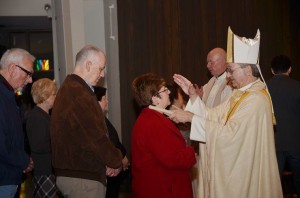 I had a conversation with a friend yesterday after Candlemas and we both lamented the diminishment of a lively devotional life for Catholics. Today’s feast of Saint Blase and the blessing of throats would be a part of that lively devotional life. I would claim —not scientifically, mind you— that many Catholics don’t know of Saint Blase and the laudable custom of blessing throats even though he gets a nominal mention in places. In the medieval Christianity the faithful’s cult of Blaise was arguably one of the most popular. England, once-upon-a-time, had a national holiday devoted to Saint Blaise and it is said that in the Diocese of Rome there were 35 churches dedicated to Saint Blase.
I had a conversation with a friend yesterday after Candlemas and we both lamented the diminishment of a lively devotional life for Catholics. Today’s feast of Saint Blase and the blessing of throats would be a part of that lively devotional life. I would claim —not scientifically, mind you— that many Catholics don’t know of Saint Blase and the laudable custom of blessing throats even though he gets a nominal mention in places. In the medieval Christianity the faithful’s cult of Blaise was arguably one of the most popular. England, once-upon-a-time, had a national holiday devoted to Saint Blaise and it is said that in the Diocese of Rome there were 35 churches dedicated to Saint Blase.